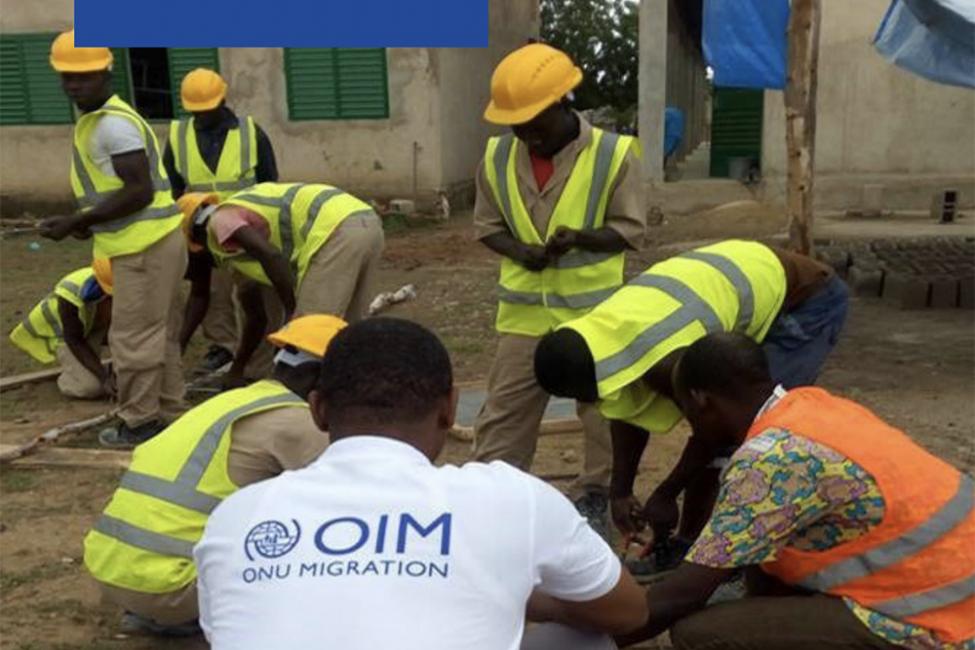-
Who we are
WHO WE AREThe International Organization for Migration (IOM) is part of the United Nations System as the leading inter-governmental organization promoting since 1951 humane and orderly migration for the benefit of all, with 175 member states and a presence in 171 countries.
-
Our Work
Our WorkAs the leading inter-governmental organization promoting since 1951 humane and orderly migration, IOM plays a key role to support the achievement of the 2030 Agenda through different areas of intervention that connect both humanitarian assistance and sustainable development.
What We Do
What We Do
Partnerships
Partnerships
Highlights
Highlights
- Where we work
-
Take Action
Take Action
Work with us
Work with us
Get involved
Get involved
- Data and Research
- 2030 Agenda
Return and Reintegration: IOM Releases 2018 Highlights
Geneva – Today (19 July), the International Organization for Migration is releasing the 2018 Return and Reintegration Key Highlights, which provides trends and figures – as well as key initiatives – on the number of migrants assisted to return, voluntarily, to their countries of origin, as well as efforts IOM has made to assist and reintegrate these returnees into their communities during the past year.
In 2018, IOM assisted a total of 63,316 migrants in returning home through its Assisted Voluntary Return and Reintegration (AVRR) programmes, representing a 12 per cent decrease as compared to 2017.
As in the previous year, this trend continues to indicate a return to a normal situation after an exceptionally high number of beneficiaries were assisted from the European Economic Area (EEA) and Switzerland in 2016.
2018 confirmed other key trends, such as an increase in assisted voluntary returns from regions outside the EEA and Switzerland, particularly in West and Central Africa, as well as an increase in the caseload of migrants in vulnerable situations assisted worldwide.
Now in its 41st year, IOM’s AVRR programmes are part of the Organization’s core mission. IOM started implementing AVRR programmes in 1979 and has since then provided support to over 1.7 million people.
In 2018, 65 IOM country offices in host or transit countries provided reintegration-related counselling services to 18,274 beneficiaries before their departure. At the same time, IOM offices in 64 countries of origin provided reintegration-related counselling to 41,461 beneficiaries upon their return.
“2018 was a particularly eventful year in the field of migration, including on return and reintegration,” said Anh Nguyen, Head of IOM’s Migrant Protection and Assistance Division. “This publication is key in highlighting global trends and initiatives undertaken by IOM and its partners all over the world to ensure that return takes place in a safe and dignified manner and that reintegration is sustainable,” he added.
Of the 63,316 migrants assisted last year, almost half – 30,919 individuals, or 49 per cent of all AVRR beneficiaries – were reached by IOM in just two countries, Germany and Niger, each with about 15,000 migrants IOM engaged. The other countries sending large numbers of AVRR beneficiaries home included Greece (4,968 migrants), Austria (3,469), Djibouti (3,392), Belgium (2,795), Netherlands (2,149), Morocco (1,508), Turkey (1,494) and Italy (958).
Among those opting to go home, Iraqi citizens comprised the largest contingent in 2018, with 5,661 returnees, followed by Guinea (5,088), Ethiopia (4,792), Mali (4,041), Georgia (2,681), Afghanistan (2,232), Albania (2,167), Russian Federation (1,952), Ukraine (1,901) and Côte d'Ivoire (1,834).
IOM’s AVRR programmes are guided by one vision, seven principles and six objectives embedded in IOM’s AVRR framework, published in December 2018 with the adoption of the Global Compact for Safe, Orderly and Regular Migration (GCM).
These programmes help migrants who are unwilling or unable to stay in their host countries to return to their countries of origin. In parallel, IOM country offices worldwide promote the sustainable reintegration of migrants through reintegration counselling (either pre-departure or upon arrival), referral, individual as well as collective and community-based reintegration assistance.
The 2018 Return and Reintegration Key Highlights is available in full here.
For more information please contact IOM HQ: Noëlle Darbellay, Tel: +41 22 717 9562, Email: ndarbellay@iom.int


